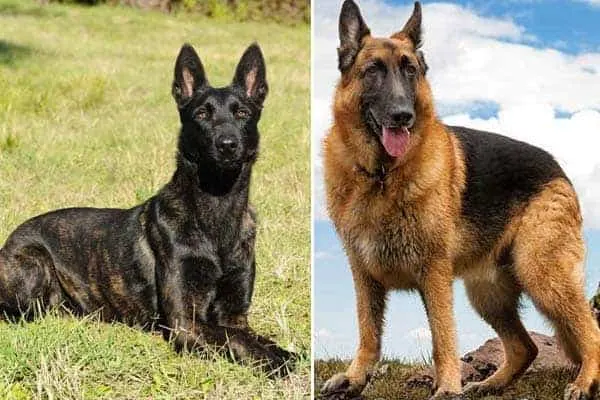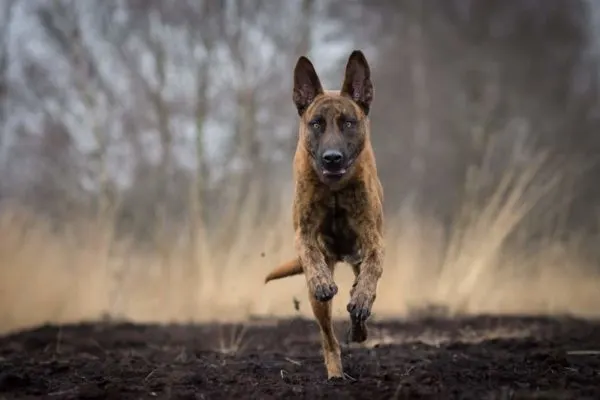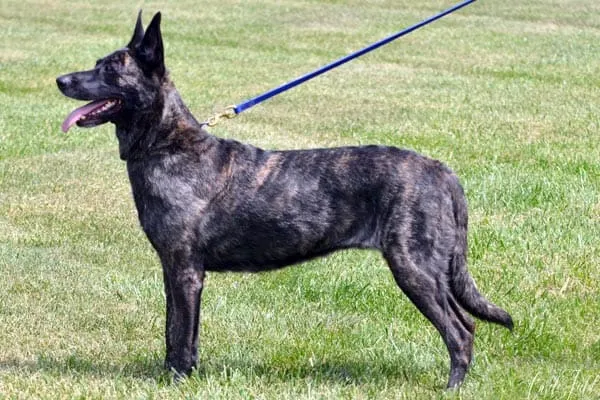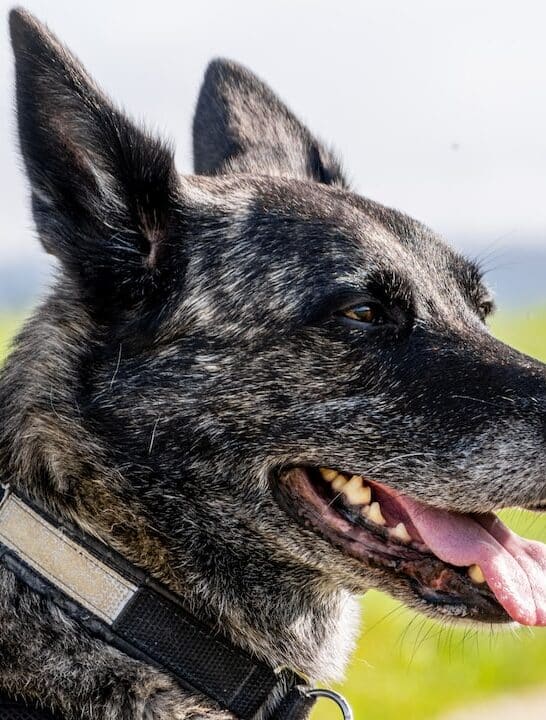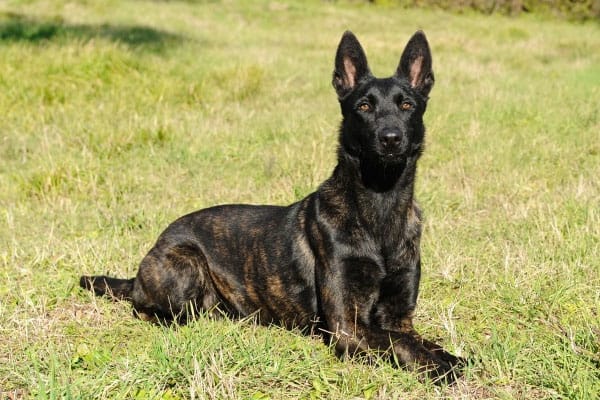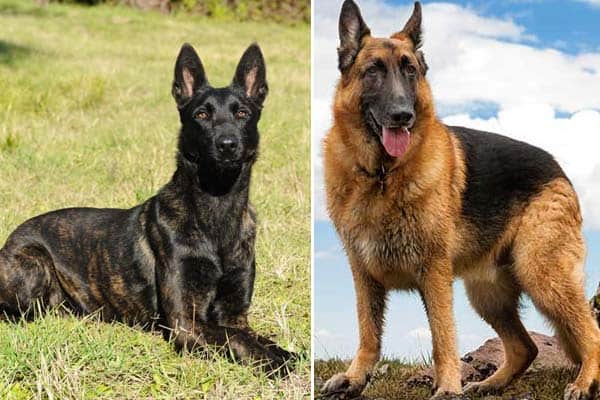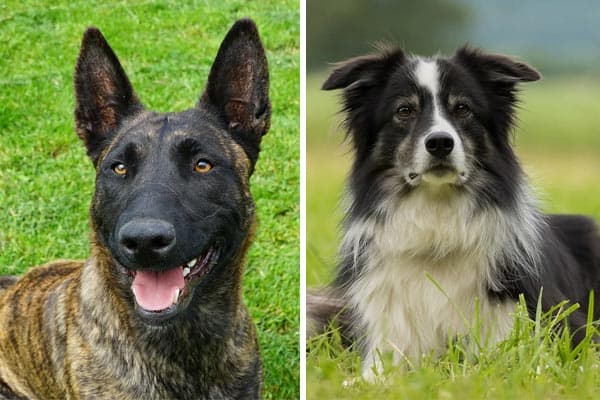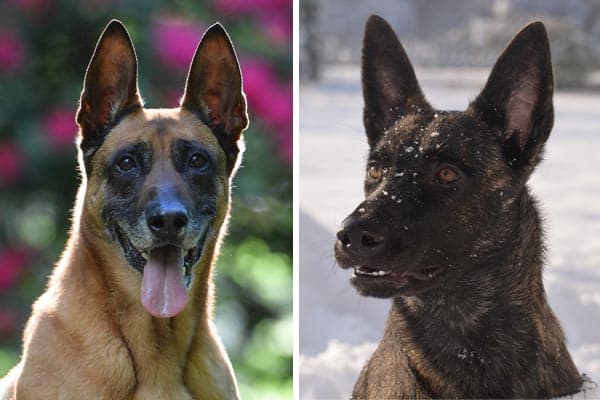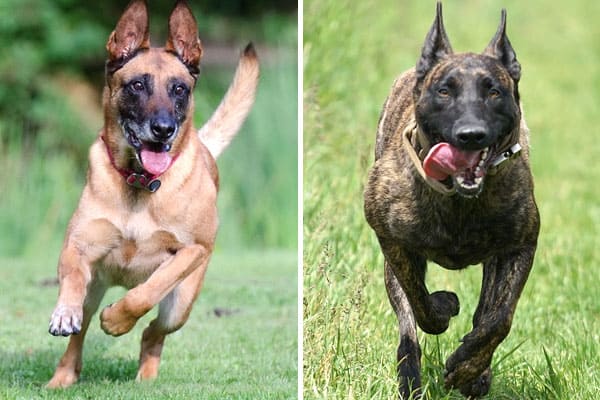Dutch Shepherd German Shepherd Mix: An Unparalleled Guardian and Protection Dog
Thanks in large part to blockbuster movies and popular culture, most people can identify the legendary German Shepherd dog on sight even if they aren’t dog lovers.
The Dutch Shepherd is far more obscure and most people don’t even realize these dogs exist.
This is one reason why some breeders are choosing to start hybrid breeding programs to cross the German Shepherd dog line with Dutch Shepherds.
Such programs infuse much-needed genetic diversity into the purebred German Shepherd breed line and the ultimate goal is to improve breed health and boost longevity.
If you are considering adding a Dutch Shepherd German Shepherd mix dog to your family, this is definitely the article you need to read to learn all about this new up-and-coming companion canine.
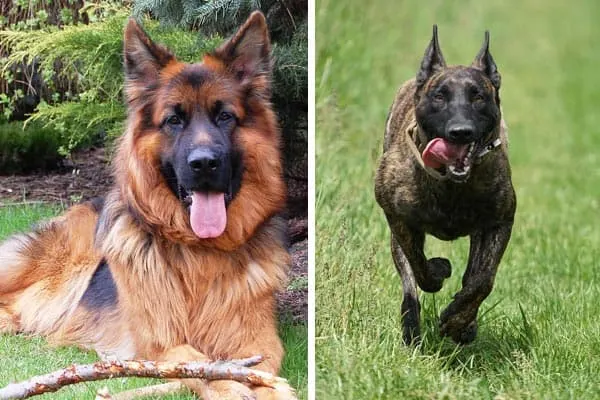
See a Dutch Shepherd and a German Shepherd Dog Being Trained in K-9 Protection
As this gripping YouTube video training session showcases, both the Dutch Shepherd and the German Shepherd make stellar protection and guard dogs.
This video highlights how critically important it is to provide a working protection dog breed with appropriate training and socialization so the dog knows the difference between a friendly person or animal and a potentially dangerous situation.
Dutch Shepherd German Shepherd Mix: Dog Breeds History
Learning more about the Dutch Shepherd and German Shepherd dog breed histories is a great way to prepare to care well for your Dutch Shepherd German Shepherd mix pup.
Dutch Shepherd history
According to the American Kennel Club (AKC), the Dutch Shepherd is one of only a small number of so-called “naturally occurring” dog breeds. In other words, the Dutch Shepherd is thought to not be a manmade dog breed.
In an age where dogs come in literally every shape and size, finding a natural dog breed is quite rare.
It also means many see a strong resemblance between the Dutch Shepherd and the wild wolf, which tends to be the case when there has been less human manipulation of the breed genome.
Dutch Shepherds were found in rural areas and were then developed further to work as all-purpose herding, livestock guarding, and droving dog. The breed was first noticed in The Netherlands, which is where the dog gets their breed name.
German Shepherd history
The German Shepherd is currently the second most popular purebred dog breed (out of 196 registered purebred dog breeds) in America, according to the American Kennel Club (AKC).
The German Shepherd was always intended to be the perfect herding and livestock guarding dog.
The breed founder, a former German cavalry officer named Captain Max von Stephanitz, was said to have crossed the first German Shepherds with wild wolves to obtain his ideal dog.
Today, German Shepherds are second only to the Belgian Malinois as the breed of choice for K-9, military, police, and private protection and security work.
Dutch Shepherd German Shepherd mix history
As this overview highlights, you won’t find two more hard-working, courageous herding, guarding, and protection dogs than the Dutch Shepherd and German Shepherd.
This bodes well for any hybrid breeding program built on these two breed lines.
Dutch Shepherd German Shepherd Mix Personality & Temperament
So what is the temperament and personality of a Dutch Shepherd German Shepherd mix dog going to be like?
Since there is no accurate way to foretell how much genetic influence each parent breed will have on a given puppy, the best way to consider what your adult dog will need from you is to learn more about each parent breed’s personality and temperament.
Dutch Shepherd personality and temperament
Dutch Shepherds are herding dogs through and through. This means your dog will have a nearly irresistible urge to herd “their” pack – including you, your children, and other family pets.
Dutch Shepherds also have a strong prey drive and chase instinct, which means if your family already includes other small prey-type family pets, they may not be safe with a Dutch Shepherd in the house.
Overall, Dutch Shepherds are lively, smart and fun-loving, but can be somewhat stubborn, too. This is common with herding dogs that have been bred to work independently from their people.
Since a Dutch Shepherd will always have a mind of their own, it will be up to you to train and socialize your dog to behave in appropriate ways for daily life in a family and local neighborhood.
German Shepherd personality and temperament
The German Shepherd dog breed would not be as popular as this dog is without some pretty stellar personality and temperament traits.
However, the GSD, as fans of the breed call them, can also be a real handful, especially in puppyhood.
These dogs are also herding dogs, which means your German Shepherd is going to herd you, your kids, your pets, and anyone else they regard as under their care and protection.
And while you will get your dog’s full, open and loving heart, visitors are likely to be greeted with aloofness and slight suspicion, which is normal for a protection dog breed.
Dutch Shepherd German Shepherd mix personality and temperament
Overall, the Dutch Shepherd and the German Shepherd dog breeds are actually quite similar in their temperament and personality.
Both dog breeds need a similar type and level of early and ongoing socialization and training to temper their protective and herding instincts and socialize well into a family and community.
Dutch Shepherd German Shepherd Mix: Size, Height, and Weight
One of the big concerns many people have when they are trying to decide on a dog breed is size.
How big will your Dutch Shepherd German Shepherd dog grow up to be? How tall will your dog be? Will you be able to find space for a big dog bed, travel crate, food, and toys?
It isn’t possible to predict in advance exactly how each parent dog’s genes may affect a puppy, but it is possible to guesstimate a potential height, weight, and size by learning more about the parent dog’s measurements.
Dutch Shepherd size, height, and weight
According to the North American Dutch Shepherd Rescue charity, these dogs typically weigh between 55 and 80 pounds and stand between 23 and 26 inches tall (paw pads to shoulders).
Females are generally slightly shorter and smaller than males in adulthood.
German Shepherd size, height, and weight
According to Vetstreet, the German Shepherd dog typically weighs between 50 and 90 pounds and stands 22 to 26 inches tall from paw pads to shoulder tops.
Here again, females are typically (but not always) slightly shorter and leaner than males in adulthood.
Dutch Shepherd German Shepherd size, height, and weight
Dutch Shepherds and German Shepherds are quite similar in height, weight, and overall build and size. These dogs are built to stay constantly on the move, herding and moving groups of livestock and keeping watch while navigating difficult terrain.
So you likely won’t have any major surprises to watch for as your hybrid puppy grows up.
Dutch Shepherd German Shepherd Mix: Training and Exercise Needs
When you choose a large, powerful dog like the Dutch Shepherd German Shepherd mix, you also take on the great responsibility of helping to train and socialize your dog to live in a family and community.
Your dog will need to learn from you how to tell the difference between a friend and a threat. Your dog will also rely on you to get their daily activity and exercise needs met.
Dutch Shepherd training and exercise needs
The Dutch Shepherd is smart, athletic, and energetic.
However, as Precision K-9 Training points out, these same traits mean that you should never ever use negative or punishment-based training methods with a Dutch Shepherd.
A Dutch Shepherd dog will be smart enough to quickly learn new skills provided they are taught in a positive, affirming, rewards-based framework.
Dutch Shepherds can be destructive if they are neglected, isolated from their human family, or too often left alone.
German Shepherd training and exercise needs
German Shepherd dogs are very active, energetic, smart dogs that don’t really have an “off” switch, especially when they are young. These dogs want to be with their people all the time and need lots of attention to stay healthy and happy.
Training must be positive and affirming – and it must also be frequent, early, and ongoing. A German Shepherd needs to learn early in life how to manage their inbuilt chase and protection instincts.
Dutch Shepherd German Shepherd training and exercise needs
The Dutch Shepherd German Shepherd mix dog is going to be a high-intensity companion canine to own and care for. Your dog will need plenty of attention, play, and activity every single day.
If you leave a Dutch Shepherd German Shepherd alone, you are likely to come home to a big mess made by a bored, lonely pup. So it is important to consider whether your time and lifestyle will permit making your dog the center of your world.
Dutch Shepherd German Shepherd Mix: Coat Care, Shedding & Grooming
Another all-too-common question aspiring dog owners often have about their new pup is in the area of coat care.
Some people are quite allergic to protein dander found on the skin and in the saliva and urine of dogs, which can make learning about shedding even more important.
In this section, we take a look at whether, how much, and how often a Dutch Shepherd German Shepherd dog might shed.
Dutch Shepherd coat care, shedding, and grooming
The Dutch Shepherd has the traditional double layer working dog coat that nearly all working dog breeds have.
In puppyhood, a Dutch Shepherd will have a single layer puppy coat. Around the age of six months, the puppy coat will start to shed out and the adult double layer coat will begin to grow in, which may take another six months to conclude.
During this time, you will see a lot of shedding, and this will be something to get used to because Dutch Shepherds shed both year-round and seasonally.
To further complicate matters, Dutch Shepherds are bred in three coat types: short hair, long hair, and rough hair.
Each coat type has different brushing and grooming needs. The short hair is the easiest coat type to care for and the least prone to tangles and mats.
To best predict the amount of brushing, grooming, shedding and overall coat care your puppy might need in adulthood, it is important to find out as much as possible about the coat type of the Dutch Shepherd parent dog.
German Shepherd coat care, shedding, and grooming
German Shepherd dogs have the traditional double layer working dog coat. The outer layer is medium length and the inner layer is shorter and very thick.
German Shepherds will shed lightly year-round and very heavily during a seasonal “coat blow” when the undercoat completely replenishes itself.
These dogs don’t need a lot of bathing and a good brushing every few days can readily keep the amount of shed hair under control. During coat blows, you may want to brush daily.
Dutch Shepherd German Shepherd mix coat care, shedding, and grooming
As you can see, here is one of the areas of greatest uncertainty when you choose a Dutch Shepherd German Shepherd mix dog.
If your dog inherits a short hair coat, you won’t have a lot of brushing or grooming to do – which won’t be the case if your dog grows up to have a long or rough hair coat.
Either way, however, you can look forward to lots of year-round and seasonal shedding.
Dutch Shepherd German Shepherd Mix: Longevity & Health Issues
Once you make the commitment to share your life with a companion canine, you just want your dog to be with you for as long as possible.
Unfortunately, as you will notice in this section, the German Shepherd has an all-too-short life expectancy. However, this may be moderated somewhat by the Dutch Shepherd’s genetic influence.
Since both dogs are prone to similar joint issues, it is important to take your time and do your research to pick the healthiest, sturdiest puppy.
Dutch Shepherd longevity and health issues
The Dutch Shepherd has not yet been registered in the Canine Health Information Center (CHIC) database to track potential genetic health issues.
However, the American Dutch Shepherd Association highlights the following known possible genetic health issues you need to be aware of:
- Hip dysplasia.
- Eye health issues.
- Known anesthesia sensitivity.
The Dutch Shepherd has a typical life expectancy of 11 to 14 years.
German Shepherd longevity and health issues
According to the Canine Health Information Center (CHIC) database, the German Shepherd breed has the following known possible genetic health issues you need to be aware of:
- Hip dysplasia.
- Elbow dysplasia.
- Cardiac issues.
- Eye health issues.
- Autoimmune thyroiditis.
- Degenerative myelopathy.
- Temperament issues.
The German Shepherd has a typical life span of seven to 10 years.
Dutch Shepherd German Shepherd mix: longevity and health issues
As this overview showcases, you can expect your Dutch Shepherd German Shepherd dog mix to be particularly susceptible to issues in the joints and eyes.
By working with a reputable, health-focused hybrid dog breeder, you can ensure the parent dogs have been pre-tested to rule out passing along these known genetic health issues to your puppy.
Dutch Shepherd German Shepherd Mix: Guarding and Protection Instincts
Perhaps the number one reason to choose a Dutch Shepherd German Shepherd mix is if you want a guardian and protection dog to watch over you and your family.
But it is equally important to understand that your dog is going to need early and intense ongoing socialization and training to learn the difference between a friend and a foe. Otherwise, your dog can potentially put you, your neighbors, and everyone in your local neighborhood at risk.
This will take an intense time commitment on your part and it is vital to be prepared for this before you make a commitment to these high-drive, high-energy dogs.
Dutch Shepherd German Shepherd Mix: Good with Kids & Other Pets
Dutch Shepherd German Shepherd dogs can be good with older kids who are old enough to remember how to gently handle and interact with a pet dog.
However, the same cannot be said of mixing a Dutch Shepherd German Shepherd dog with other family pets. Smaller vulnerable prey-type family pets may be in danger from these dogs, with their high chase instinct and prey drive.
Dutch Shepherd German Shepherd Mix: Is This the Right Dog For You?
The Dutch Shepherd German Shepherd mix dog is a good fit for people and families with active lifestyles they can share with a dog.
Recommended reading
- Kindred Cousins: An In-Depth View of the Dutch and German Shepherd
- 15 Top Wanted German Shepherd Mixes: How to Know About














